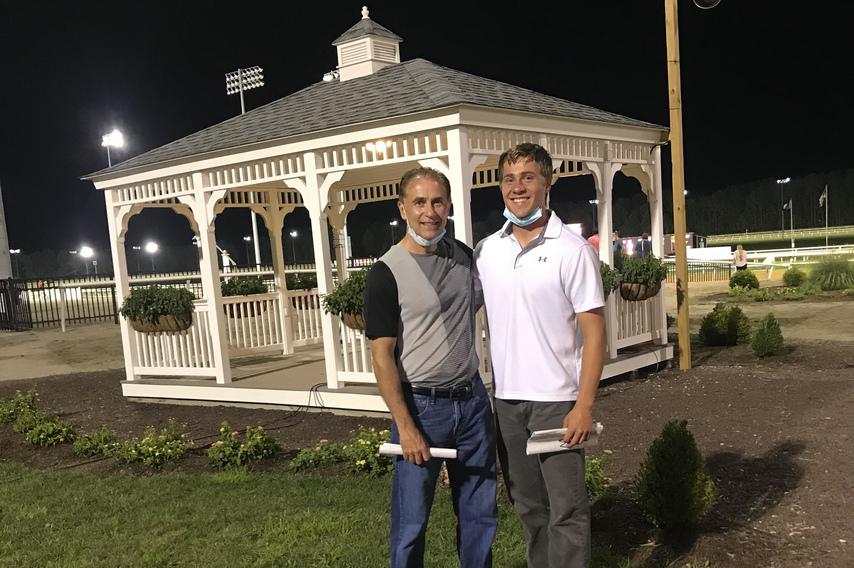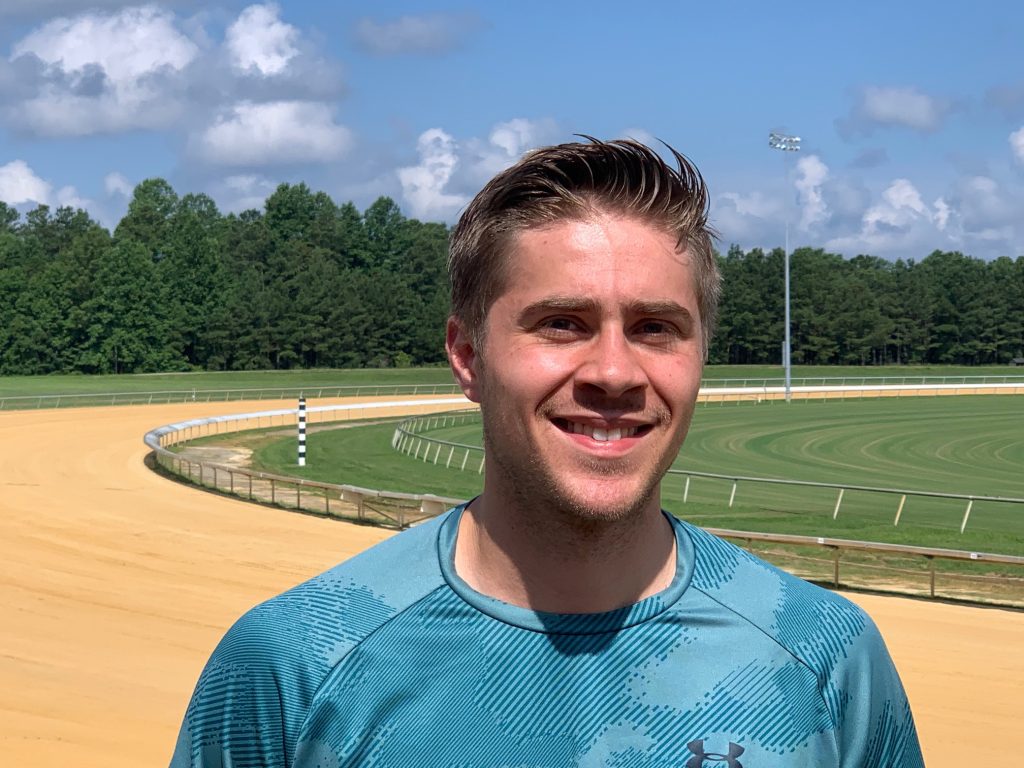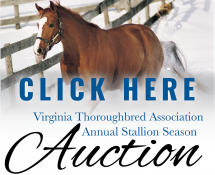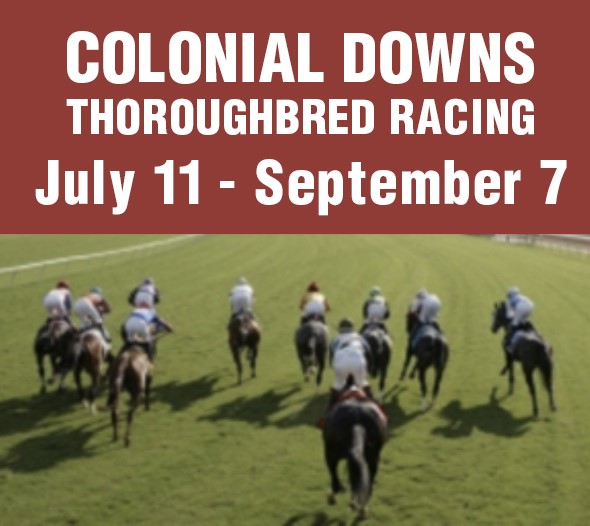Scotia grad has worked for a breeding farm this year, and after a short stint at Colonial Downs, will work for Breeders’ Cup
The following article was written by Mike Mac Adam and appeared at dailygazette.com on August 27.
Left a Message left a baby horse on the ground this spring, and Alex Sausville was there for it, helping with the birth in Kentucky.
Not long after, he saw another one of her babies in full bloom, leaping over steeplechase hurdles in Virginia.
It was full circle — or full oval, if you will — for the Scotia-Glenville High graduate, who helped the Tartans win the Class A boys’ basketball state championship in 2014.
Committed to a career in Thoroughbred horse racing, Sausville has been exposed to a variety of experiences in the short time since he spent a year and a half in the University of Arizona’s Race Track Industry Program, most recently working in the racing office at Colonial Downs in New Kent, Virginia.

With 18 racing days scheduled at the track from July 27 to Sept. 2, Colonial Downs was waylaid by cancellations, including a total shutdown because of a rash of COVID-19 positive tests.
That left Sausville in a little bit of limbo, but it won’t last long, as he will continue his burgeoning racing journey in Lexington, Kentucky, not far from his spring/summer job at Stone Farm in Paris, Kentucky. He’ll work for the Breeders’ Cup while broadening his perspective on the sport and industry, against the backdrop of the pandemic.
“The thing I learned quickly is that everything changes so quickly,” Sausville said. “And there’s so many challenges that come up here and there. You’ll see people saying ‘This is so important’ or ‘That is so important,’ different aspects of the industry that have to be dealt with, taken care of.
“We’ve improved some things, and then we move into the current situation and society that racing has to deal with. That was the No. 1 thing at Colonial was that we had to learn how to run a racetrack during this pandemic, and it was vastly different than anything any racetracks have had to do in the past.”
It was one thing after another for Colonial Downs, which ran just six of 18 cards, and the pandemic wasn’t the only culprit. The track lost two days to weather — a heat wave and a torrential rainstorm — and lost another to a power outage.
On Aug. 14, Colonial announced that the rest of the meet was canceled, in light of some jockeys, including meet leader Trevor McCarthy, testing positive.

Sausville had been working as a gap attendant in the mornings, a radio liaison between horsemen bringing workout horses onto the track and the clockers.
Three days a week, he helped in the racing office, and on race days, he was an assistant paddock judge, making sure saddlecloths were equipped with Equibase computer chips for tracking purposes.
He had worked helping the clockers as a gap assistant for one summer at Saratoga Race Course before enrolling in Arizona’s RTIP, which includes classroom education on track management and on-site work at tracks and farms.
“It really was an overview of the various parts of the racing industry,” he said. “And then it was pieces of putting us in spots where we were able to meet people and be able to go do things. The stuff that I learned in the stints that I had since I left, I got an overview while I was there, started to get an understanding of the basis of everything and then I’ve gotten to expand on that. And that comes from spending five months on a breeding farm to now spending two months at a racetrack.”
His time at Stone Farm was an eye-opener, whether his eyes were ready to cooperate or not.
“Oh, for someone who grew up as a fan with my dad at OTB and all that, to go to a breeding farm and have a 130 horses that you’re taking care of, it’s an experience that anyone who can have it should do it, because it’s incredible,” Sausville said. “Sometimes I was getting 3 a.m. calls, ‘Alright, this one’s going.’ Run from my house that I was fortunate enough that it was 20 feet from the foaling barn. Run out, throw on my stuff and me and my manager, we get this foal out.
“The experience of it, what made it so incredible is these are things you don’t see. You see the horses get to the track, but you don’t see how long it takes them. What the mares go through, what the staff goes through, the time they put into it.”
Among his favorite mares was Beyond the Waves, and not just because her delivery was an easy one.
In 2014, she foaled a colt, Bricks and Mortar, who was undefeated last year to earn the Eclipse Award for top turf male and Horse of the Year.
At Colonial, one of Left a Message’s offspring showed up in a steeplechase race, so Sausville made sure he was on the outside rail to watch.
Although his time at Colonial was short to begin with by virtue of the meet schedule, then abbreviated further by the shutdown, Sausville said he has gained more appreciation for the complexity of how the sport operates.
“The biggest thing I will say is I think people generally understand it, but the problems the pandemic has caused for each individual part of the industry, whether it’s the management side, the jockeys, the horsemen, are so different, but they’re all intertwined,” he said. “The problems are so wide-spread, and the tough part is every group has to understand that another group is going through this. Then that group has to understand what they’re going through. It’s quite the puzzle, and I think they did the best they could with the situation here. But it is not easy.”
Despite being only 24, Sausville can now count 70 tracks at which he has watched live racing, now that he has attended Colonial.
The St. John Fisher College graduate’s roster of tracks visited totals about 135, if you count closed facilities, and this weekend he hopes to make a pit stop at the former Marlboro (Maryland) racetrack grounds east of Washington, D.C., closed for good in 1993 and now the site of a small multi-sport arena.
“You’ll get a kick out of this, I’m headed to Charles Town for the Classic tomorrow [Friday], then I’m moving back to Lexington,” he said with a laugh.
Reach Mike MacAdam at mikemac@dailygazette.com. Follow on Twitter @Mike_MacAdam.







